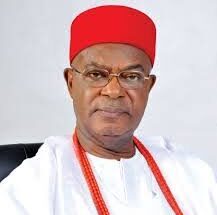“Insanity is doing the same thing over and over again and expecting different results”- Albert Einstein.
There is no gainsaying the fact that the current centralised policing system in the country has a lot of challenges ranging from shortages of personnel, poor remuneration, poor working condition, inadequate operational vehicles to lack of modern communication gadgets, delay in promotion, and gross underfunding, etc.
There is a consensus among Nigerians that the Nigeria Police Force does not have the capacity to properly police all the nooks and crannies of Nigeria due to the above-mentioned challenges. However, there is no general consensus on the best way to address the said challenges.
Opinions are sharply divided among Nigerians from all the geo-political zones of the country with some Nigerians advocating state Police.as the best way to address the challenges of the force and make it better while others are still advocating the continuation of the centralised policing system despite its challenges.
Most of the proponents of state police are from Southern Nigeria. From around 2010 when the issue began to take a centre stage virtually all governors from the South have been in support of state police while northern governors have been generally sceptical about the issue. However, It is on record that in the recent past most governors from the North have joined the state police advocacy as the best way to address the challenges of the force.
It is apt to state that there is a lot of scepticism about state police, particularly by northerners due to their ugly experiences of their once practiced local police called the ‘Yan-Doka (the Native Authority Police) during the colonial and post independence era. There were allegations of political victimisation, vendetta, and torture against the opposition parties by the ‘Yan-Doka on behalf of the powers that be.
The opponents of the ongoing debate on state police base their argument on the insinuation that state governors may use it for political victimisation and vendetta against the opposition parties. In addition, they argue that Nigerians may not freely stay in all parts of the country as provided by the constitution. They cite instances where citizens whose grandparents were born in some states of the federation are seen and treated as settlers rather than indigenes. They further argue that there are all sorts of discrimination against them in terms of indigene certificates, business permits and premises issuance. Discriminatory policies that affect their means of livelihood are often introduced.
In my view with the economic situation of the country and competing demands from the public service, health, education, roads, rail, aviation, and the agricultural sectors of the economy, etc., the federal government will always find an excuse for its inadequate funding of the centralised policing system of the country.
Nigeria is grossly under policed with only about 400, 000 policemen to over 200 million people. It is apt to point out that even with the said numbers, Mr. Mike Okiro, a former inspector general of police and a former chairman Police Service Commission, once said: ” …more than 150,000 police officers are attached to Very Important Personalities (VIPs) and unauthorized persons” (Daily Trust, February, 12,2018).
Going by Mr Okiro’s assertion, it means only about 250,000 policemen work for ordinary Nigerians. By United Nations standard, a country is supposed to have one fully equipped as well as well- motivated police officer to 400 persons. By the said standard, we are supposed to have over one million policemen. Based on what we have, it therefore means we have a deficit of over 600,000 policemen.
However, it is important to note that, in the first republic (1960-1966) we had three types of police in Nigeria. (1) the Federal Police (2) the Regional Police, (3) the Native Authority Police (NA). In fact, that arrangement lasted up to 1969 before its abolishment by the military.
In my suggestion, since opinions are divided let us have a hybrid policing system where the centralised policing system under the federal government remains and then allow any state that could afford it to establish its own state police. It should be made optional for states. The federal police should continue to operate alongside the state police force that may be established by those states that could afford it.
This means police matters should be in the concurrent legislative list where the federal, states and even the local governments should have powers on. This approach will go a long way in increasing the number of personnel that we badly need to police the large swathes of our ungoverned territory but sadly lack.
May God bless Nigeria!
Nurudeen Dauda,
Kaduna, Kaduna state




